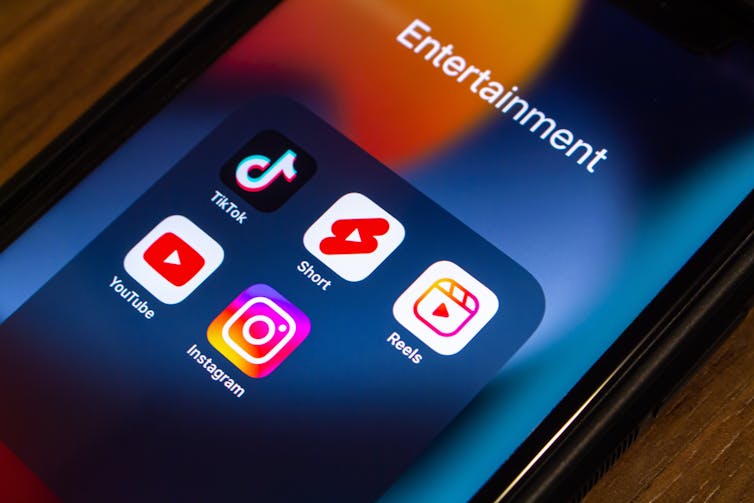Media
Want to be a social media influencer? You might want to think again
|
|
Canadians spend more than two hours per day on social media platforms. Social media is becoming more prevalent every day, and influencers and those that want to be influencers are too.
Influencing is an all-new career option that, until recently, didn’t exist. A social media influencer is someone who has established a reputation for being knowledgeable about a specific topic or industry and has an online following that they engage with.
Social media influencers build relationships with their followers through the content they share and interactions on live streams, comments and chats. This in turn builds a greater sense of community and ultimately gives influencers more influential power. However, the world of influencing is not always as honest and exciting as it’s cracked up to be.
Allure of influencing
As experts in social media and health outcomes, we recently examined the aspirations, desires and rationales of becoming a social media influencer among young adults. We asked 750 Canadians between 16-30 years old, who were mostly women, about their social media use and thoughts about social media influencers.
The results showed that 75 per cent of participants wanted to become social media influencers. The top three stated reasons for wanting to become social media influencers were for the money, being able to try new products or services and because they thought the work would be fun.
Other factors, such as excessive social media use; knowing, following or trusting influencers; and being willing to accept money to market a product even if they didn’t like it, also informed aspirations to become a social media influencer.
Influencers often edit their content, creating a highly desirable image that is not always reflective of reality. Some might promote products they may not truly believe in or like for financial gain. This suggests not all social media influencers are as trusting as users perceive them to be.
According to one U.S. study, one-third of young people trust health influencers on TikTok more than their doctors. This is seriously concerning, as influencers do not need any academic or professional credentials, and tend to curate their online persona through opinions rather than facts.
More disadvantages than benefits
Many social media users feel a career as an influencer is more desirable than a traditional career. Influencers tend to be idolized, especially by younger generations. So it’s not surprising that many of them are interested in a career in influencing. However, the disadvantages may outweigh the benefits.
Most participants in our study cited financial gain as the main reason for wanting to become a social media influencer, but the career might not be as lucrative as some think. It is true that top influencers can earn millions of dollars on their respective platforms, but this is the exception rather than the rule.
The average user who monetizes their content will bring in significantly less depending on the platform, number of followers, method of marketing and the type of content they are creating.
While there is limited research on what types of content are easier to monetize, many top influencers belong to different genres. That suggests intangible factors, like how authentic an influencer is perceived to be and how well they communicate and connect with their followers, are the most important keys to success.
Some platforms such as YouTube require meeting certain thresholds of subscribers and viewers before content can be monetized, with no guarantee that the creator will ever meet that threshold, even if they post regularly.
On top of an unpredictable income, another disadvantage is volatile job security. Social media networking sites use algorithms to sort posts on a user’s feed to ensure that the user sees content that the algorithm deems is relevant to them at any given time.
As this technology advances, it is becoming more difficult than ever to predict how algorithms popularize content. Even well-established content creators struggle to diversify their content and meet the ever-changing demands of seemingly random algorithms.

(Shutterstock)
Unforeseen challenges
Unforeseen national policy changes can also add uncertainty. Canada’s impending Bill C-11 will require streaming platforms like YouTube to promote a minimum amount of Canadian content to its Canadian users.
This is worrisome for some Canadian content creators, as Bill C-11 does not specifically define what is considered Canadian content, and has the potential to reduce the visibility of their content and make it difficult for them to reach the same number of users.
Similarly, the TikTok bans in Canada, the U.S. and elsewhere have some content creators on edge about potentially losing access to the platform.
All these issues make influencing a difficult career to break into and maintain. It is important for those interested in making a career out of influencing to be aware of these challenges.
As a form of independent entrepreneurship, influencing comes with no regulation, training or support. The result of this can be young content creators struggling with physical and mental health issues brought on by cyberbullying and high stress.
With more young people wanting to be influencers, it is our job to educate rather than dissuade. By highlighting these realities, we hope to mitigate some of the negative outcomes associated with a career in social media influencing.





Media
The media industry is dying – but I can still get paid to train AI to replace me – The Guardian


Say what you like about the Germans, you can always count on them to find just the right word for anything. Take “weltschmerz”, for example, which roughly translates to “world pain”. It signifies despair at the suffering in the world – and a deep anguish that stems from knowing that a better world is possible. Is there a more apt encapsulation of the current moment?
For the past six months I, like many others, have been suffering from an acute case of weltschmerz. As someone of Palestinian heritage I have been weighed down by survivor’s guilt as I’ve watched the unfolding genocide in Gaza. For a while, I didn’t have the emotional energy to write. The only way I could get out of bed and make it through the day was by avoiding the news completely. Which … isn’t an ideal scenario when you largely write about the news for a living. So, at one point, I decided on a career pivot and applied for various non-writing jobs, including one at a dog food manufacturer. Reader, I was rejected. In fact, I didn’t even make it to the first round of interviews; I was humbled by a dog’s dinner.
Obviously, I am writing again now. But for practical purposes I keep an eye on what else is out there. The media industry, after all, seems to be in freefall; it’s always good to try to secure a parachute, just in case. And, the other day, one seemed to present itself to me in my LinkedIn messages. According to an automated missive from an AI company, I have the perfect set of skills to help them write the first draft of AI history. I could, the generic message enthused, get “up to $15 [£12] an hour”, to coach an AI model “by assessing the quality of AI-generated writing … and crafting original responses to prompts”.
In other words: I could get paid less than the New York minimum wage to train an AI model to take over my job. Is there a German word to describe that particular situation, I wonder? I’ll have to ask ChatGPT.
Arwa Mahdawi is a Guardian columnist
Media
Social media use increases weight-related bullying risk, study says – Global News
[unable to retrieve full-text content]
Social media use increases weight-related bullying risk, study says Global News





Source link
Media
Georgia’s parliament votes to approve so-called ‘Russian law’ targeting media in first reading – CityNews Kitchener


TBILISI, Georgia (AP) — Georgia’s parliament has voted in the first reading to approve a proposed law that would require media and non-commercial organizations to register as being under foreign influence if they receive more than 20% of their funding from abroad.
Opponents say the proposal would obstruct Georgia’s long-sought prospects of joining the European Union. They denounce it as “the Russian law” because Moscow uses similar legislation to stigmatize independent news media and organizations seen as being at odds with the Kremlin.
“If it is adopted, it will bring Georgia in line with Russia, Kazakhstan and Belarus and those countries where human rights are trampled. It will destroy Georgia’s European path,” said Giorgi Rukhadze, founder of the Georgian Strategic Analysis Center.
Although Georgian President Salome Zourabichvili would veto the law if it is passed by parliament in the third reading, the ruling party can override the veto by collecting 76 votes. Then the parliament speaker can sign it into law.
The bill is nearly identical to a proposal that the governing party was pressured to withdraw last year after large street protests. Police in the capital, Tbilisi, used tear gas Tuesday to break up a large demonstration outside the parliament.
The only change in wording from the previous draft law says non-commercial organizations and news media that receive 20% or more of their funding from overseas would have to register as “pursuing the interests of a foreign power.” The previous draft law said “agents of foreign influence.”
Zaza Bibilashvili with the civil society group Chavchavadze Center called the vote on the law an “existential choice.”
He suggested it would create an Iron Curtain between Georgia and the EU, calling it a way to keep Georgia “in the Russian sphere of influence and away from Europe.”
The Associated Press
-



 Tech20 hours ago
Tech20 hours agoiPhone 15 Pro Desperado Mafia model launched at over ₹6.5 lakh- All details about this luxury iPhone from Caviar – HT Tech
-



 Sports19 hours ago
Sports19 hours agoLululemon unveils Canada's official Olympic kit for the Paris games – National Post
-



 Science22 hours ago
Science22 hours agoAstronomers discover Milky Way's heaviest known black hole – Xinhua
-
News17 hours ago
Toronto airport gold heist: Police announce nine arrests – CP24
-



 Tech18 hours ago
Tech18 hours agoVenerable Video App Plex Emerges As FAST Favorite – Forbes
-
Media21 hours ago
NPR's liberal bias: Editor exposes media's lack of viewpoint diversity – USA TODAY
-
News14 hours ago
Loblaws Canada groceries: Shoppers slam store for green onions with roots chopped off — 'I wouldn't buy those' – Yahoo News Canada
-



 Science23 hours ago
Science23 hours ago'Almost hit my son' – Space junk crashes through Florida home – BBC.com




